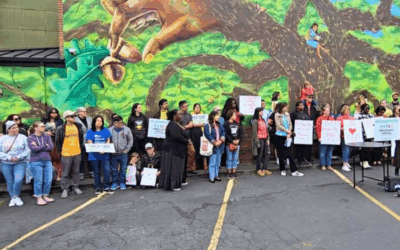Policy Resources
All children are born full of hope and potential, and we know that early childhood experiences have a profound and lasting impact on early childhood development. Despite this, inequities in our early learning and care system fail to provide equal opportunity—especially for children of color, children in rural areas, and children experiencing poverty. This was only made worse by COVID-19 and we are still uncovering the true impact of the pandemic, and the disruption it caused to early childhood development. We must pay serious attention to how our children develop and ensure this process goes well, so Oregon can thrive now and into the future.
Inspired by the knowledge of how critical the first years of life are, Oregon has started to make progress for young children. We must keep going. When we work in partnership with children, families, communities, and policymakers, we can create transformative and equitable solutions. To make this a reality, Oregon needs courageous leaders that will hold the state and systems accountable to deliver on that vision.

5 Things You Should Know About Early Childhood in Oregon
1. Zip code, income, and race/ethnicity are powerful predictors of a child and family’s opportunities to thrive (Child Opportunity Index).
2. Nearly 50 percent of Oregon births are funded by Medicaid. For Oregon babies to thrive, it is essential to have a health system that serves young children well (Oregon Health Authority).
3. The Student Success Act (2019) dedicated 20 percent of revenue to early childhood services. It doubled the state’s investment in early learning and care, with investments in all the place children learn and grow. It includes needed investments in early learning, culturally specific programs, family support, and the early childhood workforce (Oregon Department of Education). Even with these investments, Oregon has a long way to go to reach all children and families.
- All 36 counties in Oregon are child care deserts for infants and toddlers. This means that for every three children, there is less than one available spot (Oregon State University).
- Only one-third of children in low-income families have access to publicly funded preschool, leaving nearly 30,000 children without access to preschool before they start kindergarten.
4. The median wage for child care workers in Oregon is $12.46 per hour. Unlivable wages across the field result in high turnover, and even before the pandemic, the annual turnover rate for child care workers in Oregon was 25-30 percent. This disproportionately impacts women of color, who make up 40 percent of the child care workforce (Center for the Study of Child Care Employment).
5. Oregon’s early childhood programs are delivered across a variety of settings to best meet the needs of children and families. This is known as “mixed delivery” and includes:
- Family, friend, and neighbor care
- Small and large family child care homes
- Head Start centers
- Community based organizations, including culturally specific organizations
- Child care centers
- Public schools, community colleges, education service districts
- Relief Nurseries
- And others
Oregon Needs Visionary Leadership
With strong leadership, we can move toward a child-centered early learning and care system that prioritizes every child’s diverse strengths and needs, starting at birth. We need leaders to commit to building an equitable childhood system that works for all Oregon kids, so young children, families, and communities can thrive.
Read our 2025 policy agenda and explore the drop down menu below to learn more about our priority issues.
Priority Issues
Early Education and Child Care
Oregon must continue to make progress to fund quality and access across early learning and care.
Every Oregon family deserves access to high quality, affordable, and culturally relevant child care. And every child care provider should be paid a wage that reflects the essential work they do. It shouldn’t fall on parents and providers alone to foot the bill for a system that benefits our whole society.
Maternal-Child Health
Improving maternal health is critical to support the earliest years of a child’s life and set children and families up for long-term success.
A healthy start for children begins with comprehensive maternal care during the perinatal period (pregnancy through the first year). Providing mothers and birthing people with comprehensive care, such as lactation services, mental health support, and monitoring for complications can significantly improve outcomes.
Supporting Families
Our youngest children and families need a coordinated, robust, and sustainable early childhood system.
Early Childhood supports and services have the power to improve outcomes and reduce disparities for our most vulnerable children. A robust, coordinated, cross-sector approach creates alignment and ensures children and families receive seamless support throughout their early years.
The Latest
What the 2025 Legislative Session Means for Oregon’s Children
After a challenging 2025 legislative session shaped by federal policy and funding constraints, early childhood advocates are still celebrating key wins.
Advocates, Parents Call on Oregon Legislature to Protect Preschool for All
A broad coalition of parents, early childhood educators, and advocates gathered at Escuela Viva in Southeast Portland to speak out in support of Preschool for All in Multnomah County, in response to a bill that would eliminate the program.
Early Childhood is Making Headlines! | CI News Roundup
Children’s Institute, early childhood advocates, and our partners are making headlines! Read the latest about Children’s Institute in the news.



